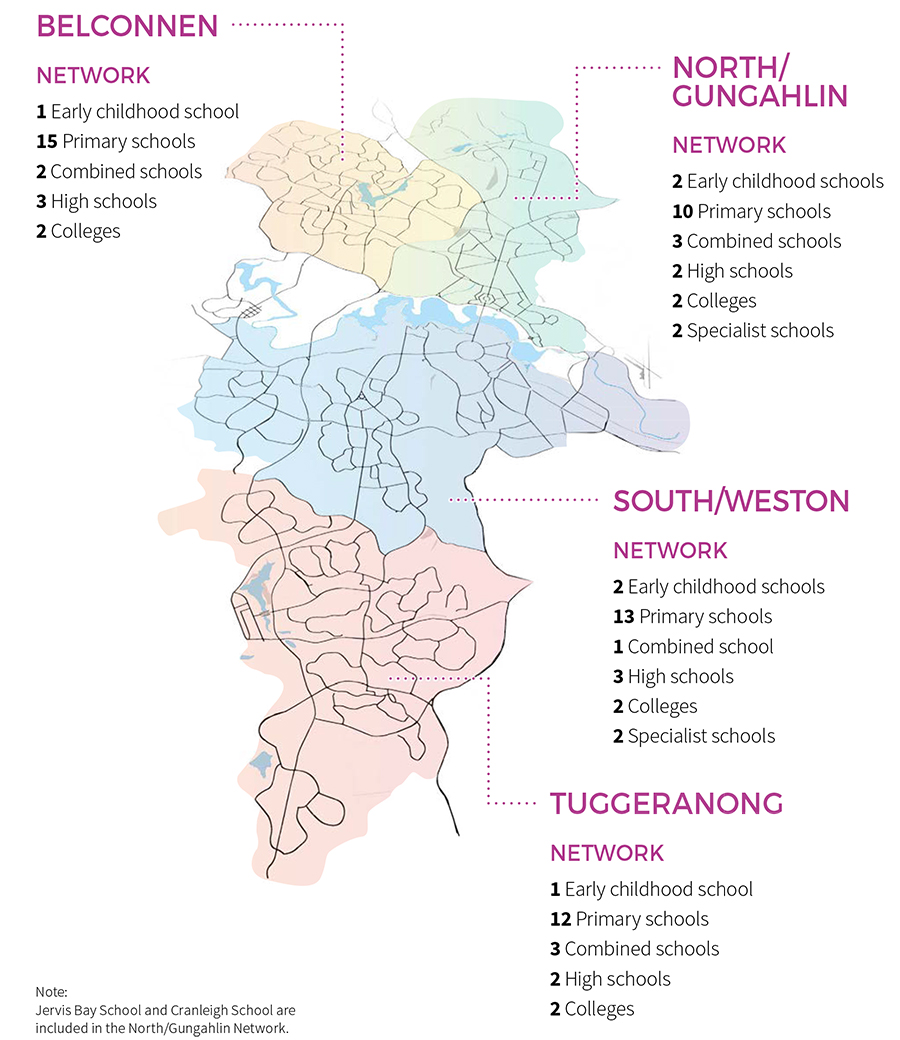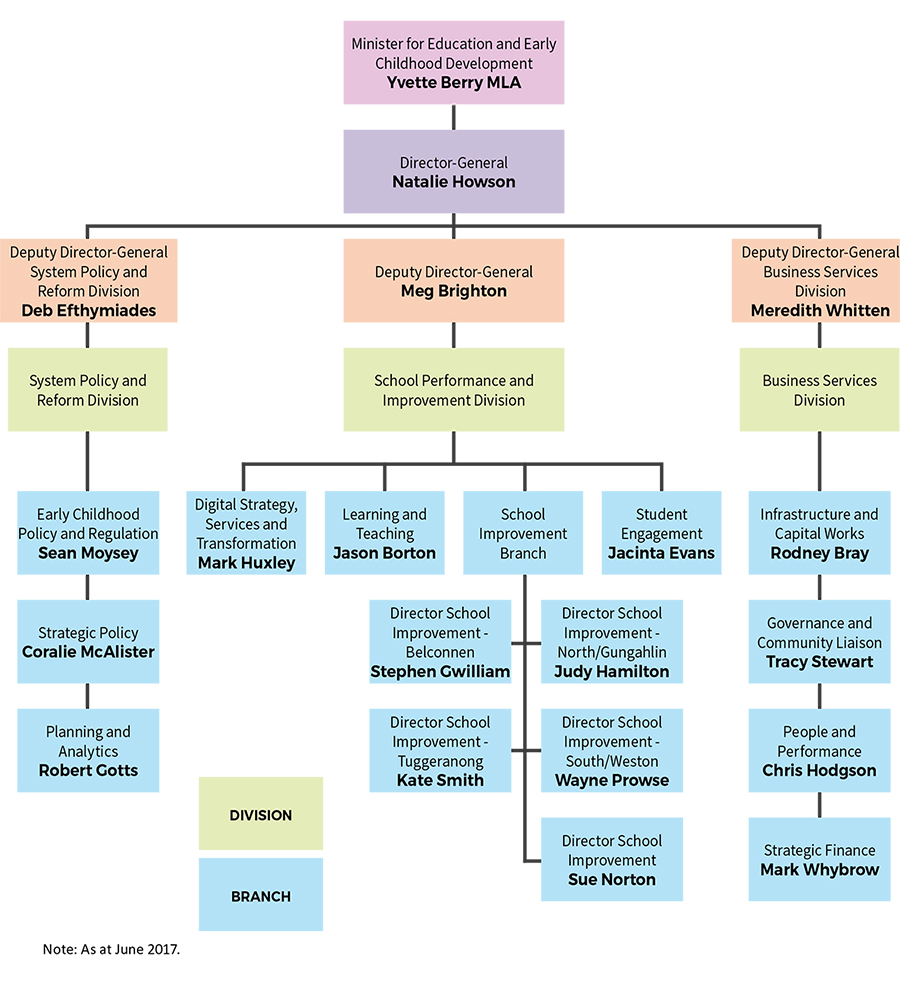The Organisation
The Education Directorate delivers quality public school and early childhood education to shape every child’s future and lay the foundation for lifelong development and learning.
Our Vision
Our vision is that every student will learn, thrive and be equipped with the skills and attitudes to lead fulfilling, productive and responsible lives. We strive to ensure that every child and young person in the ACT benefits from high quality, accessible education and early childhood education and care.
Our Values
The Directorate shares the ACT Public Service values of respect, integrity, collaboration and innovation. We use these values to shape our behaviours and actions when supporting children and young people in our schools. These values also apply across all areas of the Directorate to shape the work that our people do to support each other.
Our Priorities
To guide the Directorate’s work in achieving our strategic goals, action plans for 2016 and 2017 were developed to focus on the following priorities:
Quality learning actions focus on curriculum, assessment and reporting; literacy, numeracy and science; and early years education and care.
Inspirational teaching and leadership prioritises quality teaching; leadership capacity; and supporting teaching and learning.
High expectations, high performance focuses effort on meeting the learning needs of every student.
Connecting with families and the community aims to engage with the community and industry; reduce red tape and ensure compliance through regulatory services.
Business innovation and improvement has a focus on school performance; data for improvement; and learning environments.
Our Stakeholders
Our clients and stakeholders include:
- students and their families;
- children and their families accessing early childhood education and care;
- the Minister for Education and Early Childhood Development;
- the ACT Government;
- school and Directorate employees;
- early childhood education and care providers;
- the ACT Teacher Quality Institute and ACT Board of Senior Secondary Studies;
- community organisations;
- peak representative groups;
- non-government schools;
- the higher education sector, especially teacher training institutions; and
- employers.

Belconnen
Network
1 Early childhood school
15 Primary schools
2 Combined schools
3 High schools
2 Colleges
North/Gungahlin
Network
2 Early childhood schools
10 Primary schools
3 Combined schools
2 High schools
2 Colleges
2 Specialist schools
South/Weston
Network
2 Early childhood schools
13 Primary schools
1 Combined school
3 High schools
2 Colleges
2 Specialist schools
Tuggeranong
Network
1 Early childhood school
12 Primary schools
3 Combined schools
2 High schools
2 Colleges
ACT Public Schools – Network Distribution
The figure below shows the number of ACT public schools in each sector and their distribution across the ACT. The ACT’s newest public school is Charles Weston School, situated in the Molonglo Valley, which opened for the beginning of the 2016 school year.
The ACT public education system is based on four networks. A Director of School Improvement is assigned to each network with management responsibilities for each principal in the network and oversight of each school’s improvement agenda. An additional Director of School Improvement was appointed in 2017 to provide targeted school improvement support to the system and to identified schools.
Our Organisational Structure
During the past year, the Directorate has undergone a period of structural change to strengthen our focus on schools and students at the centre of all that we do. This structural change has resulted in business transformation across the Directorate, giving effect to this important orientation and emphasising that we are all in the learning business. A number of business units have been realigned, including bringing together all branches involved in school performance and improvement into the same division.

Note: As at June 2017.
Our Internal Accountability
Senior Executives
Director-General
Accountable to both the Minister for Education and Early Childhood Development and the Head of Service, the Director-General leads the Directorate and the network of ACT public schools to implement the Education Act 2004. The Director-General is responsible for promoting compulsory education, overseeing the operation and governance of ACT public schools, and overseeing the registration of non-government schools and home education. The Director-General also has responsibility for the Directorate’s strategic direction, including ensuring the implementation of whole-of-government strategies.
The Director-General is responsible for implementing legal requirements, policy and commitments relating to education in the ACT. In addition, the Director-General has a role in the leadership of the ACT Public Service as a member of the ACT Public Service Strategic Board.
Deputy Director-General
The Deputy Director-General leads ACT public schools, deputises for the Director-General and has responsibilities for school improvement and the delivery of education services through student-centred learning and teaching initiatives. The School Performance and Improvement division ensures accountability between student wellbeing, teaching and learning practice and student outcomes. Support services are provided in the areas of curriculum delivery, pedagogy, digital strategy, student wellbeing, pathways and transitions and Aboriginal and Torres Strait Islander education.
The Deputy Director-General leads the School Improvement, Learning and Teaching, Student Engagement and Digital Strategy, Services and Transformation branches of the Directorate.
Deputy Director-General, Business Services
The Deputy Director-General, Business Services is responsible for leading the governance and ministerial services and the planning and delivery of the human, financial and physical resources of the Directorate.
This Deputy Director-General, Business Services leads the Infrastructure and Capital Works, Governance and Community Liaison, People and Performance and Strategic Finance branches of the Directorate.
Deputy Director-General, System Policy and Reform
The Deputy Director-General, System Policy and Reform has responsibility for the development and implementation of strategic policy and reform initiatives such as the Future of Education project and the Student Resource Allocation Program, in addition to advising on the ACT’s contribution to national education reforms including those progressed through the Council of Australia Governments’ Education Council.
The Deputy Director-General, System Policy and Reform division leads the coordination of the national assessment programs and provides quality data and analytics to inform school and system improvement. The division is also responsible for regulating the early childhood education and care sector through the ACT Regulatory Authority, Children’s Education and Care Assurance, and contributing to national policy development in the sector.
Remuneration for Senior Executives
Section 10 of the Remuneration Tribunal Act 1995 requires its administrative body (the Tribunal) to inquire into and determine the remuneration, allowances and other entitlements of the Director-General and executives within the meaning of the Public Sector Management Act 1994.
The Tribunal, after a review of salary, allowances and other entitlements for executives in March 2017, decided that it would increase the salary for the Director-General and executives by 2.0 percent, effective from 1 July 2017.
Directorate Committees
The Directorate committee structure is designed to improve the effectiveness of decision making, and to ensure that decisions align with and deliver on the commitments of our 2014-2017 Strategic Plan – Education Capital: Leading the Nation.
Senior Executive Team Board
The Senior Executive Team Board (SET) is the key decision making body of the ACT Education Directorate, ensuring accountability, effective risk management, and good governance.
SET supports the Director-General in discharging their responsibilities as the responsible officer of the Directorate reporting to the Minister for Education under section 19 of the Public Sector Management Act 1994 and with specific responsibilities under the Education Act 2004. SET provides leadership, direction and guidance to the Directorate, and provides oversight of the Directorate’s governance frameworks. SET is responsible for formulating strategic direction, taking into account changing community needs and government priorities and monitoring the Directorate’s performance, compliance and assurance against its corporate commitments and regulatory responsibilities.
Membership of the SET Board includes the Director-General and the three Deputy Directors-General. Membership was extended from March 2017 to include the Chief Finance Officer and Mr Duncan Edghill, Deputy Director-General Transport Canberra, who has been appointed as an external member.
SET is responsible for:
- formulating strategic direction and policy including emergency management, protective security and all other policy frameworks;
- monitoring the Directorate’s performance, compliance and assurance against its corporate commitments and regulatory responsibilities;
- system wide performance outputs (quarterly/annual reports, budget papers and financial reporting);
compliance (such as advice from Audit Committee on Directorate compliance) and assurance outputs (litigation, insurance, legislative compliance and risk management); and - prioritising and reviewing system-wide resources (such as financial management control framework, organisational staffing profile and work health and safety).
Reform Program Board
The Reform Program Board (RPB) is responsible for driving specific programs forward to deliver outcomes and realise benefits of strategic importance to the ACT public education system. The RPB provides strategic oversight of major projects undertaken by the Education Directorate, maintaining active risk management, and monitoring interdependencies between projects and business areas.
All board members are appointed by the Director-General. Membership of the board comprises:
- Deputy Director-General, System Policy and Reform (Chair);
- Deputy Director-General (Deputy Chair);
- Deputy Director-General, Business Services;
- Seven Directors from across the Directorate (including the Chief Finance Officer); and
- External member, Executive Director, Public Transport Coordination.
Audit Committee
The objective of the Audit Committee is to provide independent assurance and assistance to the Director-General on the Directorate’s risk, control and compliance framework, and its external accountability responsibilities. The Audit Committee also reviews the annual financial statements and provides advice to the Director-General on significant risks, audit outcomes and implementation of mitigation strategies.
Security and Emergency Management Committee
The Director-General has established the Security and Emergency Management Committee to assist the Director-General and Senior Executive Team with implementing ACT Whole of Government Protective Security Policy and associated elements of Risk Management. The Security and Emergency Management Committee provides advice to the Director-General on significant security, emergency management and business continuity proposals, directions, policies and training. The Committee also makes recommendations to the Director-General, Senior Executive Team, Corporate Executive or Directors on issues in relation to security, emergency management and business continuity.
Respect, Equity and Diversity Consultative Committee
The Respect, Equity and Diversity (RED) Consultative Committee provides a forum for sharing current and emerging issues and has the responsibility for overseeing all respect, equity and diversity functions of the Directorate and its employees. The RED Consultative Committee provides advice and contributes to the development and implementation of Directorate plans. The committee also provides advice on the implementation of whole of government plans.
Directorate Consultative Committee
The Directorate Consultative Committee was established in accordance with the relevant enterprise agreements. The main objectives of the Consultative Committee are to improve consultation and communication processes between staff, senior managers and unions concerning significant changes to policy and guidelines that relate to the agreements, promote the sharing of information across the Directorate, and provide a forum for consultation.
Injury Prevention and Management Committee
The Injury Prevention and Management Committee is the process by which the Directorate consults with its worker networks and Unions on work health and safety matters. The Committee considers injury prevention and management performance measures and initiatives designed to ensure the Directorate’s workers’ health and safety at work.
Occupational Violence Steering Committee
The Occupational Violence Steering Committee governs the implementation of the safe work initiatives outlined in the Directorate’s Occupational Violence Safe Work Plan. This includes responses to issues raised in staff consultation, individual cases of Occupational Violence and recommendations of reviews of management of this safety risk completed during 2016-17. The Committee also monitors the implementation of the Directorate’s response to WorkSafe Improvement Notice IN 5771-S5ZD60-1 (IN). The Committee is chaired by the Deputy Director-General, Business Services Division and comprises the Executive Director, Workplace Safety and Industrial Relations from the Chief Minister, Treasury and Economic Development Directorate, and the Directors of People and Performance, Student Engagement, Early Childhood Policy and Regulation and School Improvement branches of the Education Directorate.
Principals’ Advisory Group
The Principals’ Advisory Group is a communication and consultation group. The Principals’ Advisory Group considers key strategic policy and operational matters and provides advice to the Corporate Executive, Senior Executive Team and Network Executive. The group raises policy and operational issues impacting on effectiveness and improvement from a school perspective, and can form subcommittees to undertake specific tasks. Membership includes five principals from each of the four Networks as well as the Director-General, Deputy Director-General and Directors, School Improvement.
Information Communications Technology Working Group
The Information Communications Technology (ICT) working group provides advice on the development and implementation of ICT policies, programs and strategies. The ICT working group makes recommendations to the Education Directorate’s Senior Executive Team through the Deputy Director-General about ICT strategic directions, policies and proposals for system wide ICT initiatives.
School Education Advisory Committee
Under section 126 of the Education Act 2004, the Minister may establish a School Education Advisory Committee as required to advise the Minister about school education or a related matter for a specified period.
During the reporting period, one School Education Advisory Committee was established by the Minister in March 2017 to advise on the implementation of the 2016 ACT Government election commitment to supply devices to year 7 and year 11 students.
Under its Terms of Reference, the Committee was tasked with providing advice on:
“Ensuring the necessary conditions for success are examined to support the implementation of the provision of a device for every child in years 7-12 across ACT Public Schools. Ensuring the program is informed by best practice, positioned to succeed, and results in ICT as a powerful tool to support learning, equity and social wellbeing for ACT Public School Students.”
The Committee comprised eight members including a director from the University of Canberra, student representatives, a teacher representative, a principal representative and a parent representative. The Chair contributed considerable experience in senior management and leadership roles in the public, commercial and higher education sectors, having implemented significant digital and reform projects for government and bringing a deep understanding of service delivery and compliance requirements. Committee members were appointed by the Minister in accordance with section 127 of the Education Act. The Committee did not have decision making functions and Secretariat support was provided by the Directorate.
The Committee met four times face to face. The Committee provided its report to the Minister on 22 June 2017, including 13 recommendations.
The Chair of the Committee was provided remuneration due to the responsibilities and skills required of the role. The total remuneration provided to the Chair was $8,800. All other members of the Committee joined on a voluntary basis and were not remunerated.
Our planning framework and direction setting mechanisms
Learners are at the centre of all that we do.
The Directorate’s vision, priorities and performance measures are expressed in our 2014-2017 Strategic Plan – Education Capital: Leading the Nation. Priorities in the Strategic Plan are reflected in annual Action Plans, which detail specific initiatives at the Directorate and school level to progress the Directorate’s strategic priorities.
Action Plans outline activities for the year and link performance measures from the Strategic Plan against these activities. Activities in the Action Plans are translated into activities for business areas and schools through annual plans.
School Annual Operating Plans, endorsed by school boards, are published on school websites.
The Directorate designed internal controls to monitor and manage risk in delivering the Strategic Plan. The Internal Audit program and the Risk Management Framework are the primary tools to manage, monitor and report on the Directorate’s risk management functions. A biannual School Compliance Report is the mechanism applied to monitor mandatory compliance in ACT public schools and provides one means of assisting the Directorate in meeting its legislative obligations.
More information on the Directorate’s governance arrangements, including risk management and the audit program, is provided in Sections B.3 to B.6 of this report.
Our Legislative Reponsibilities
Under the Australian Capital Territory (Self-Government) Act 1988 (Cwth) and the Public Sector Management Act 1994 (ACT), the Chief Minister allocates responsibility to the various Ministers, Directors-General and agencies for the administration of ACT legislation. The Minister for Education and Early Childhood Development and the Director-General of the ACT Education Directorate are administratively responsible for the following legislation:
- Education Act 2004;
- Education and Care Services National Law (ACT) Act 2011;
- ACT Teacher Quality Institute Act 2010;
- Board of Senior Secondary Studies Act 1997;
- Children and Young People Act 2008, Chapter 20; and
- Training and Tertiary Education Act 2003, Section 26.
Summary of Performance
Quality Learning
|
|
|---|---|
Inspirational Teaching and Leadership
|
|
High Expectations, High Performance
|
|
Connecting with Families and the Community
|
|
Business Innovation and Improvement
|
|
| Challenges | Outlook | |
|---|---|---|
Quality Learning
|
|
|
Inspirational Teaching and Leadership
|
|
|
High Expectations, High Performance
|
|
|
Connecting with Families and the Community
|
|
|
Business InnoSvation and Improvement
|
|
|





